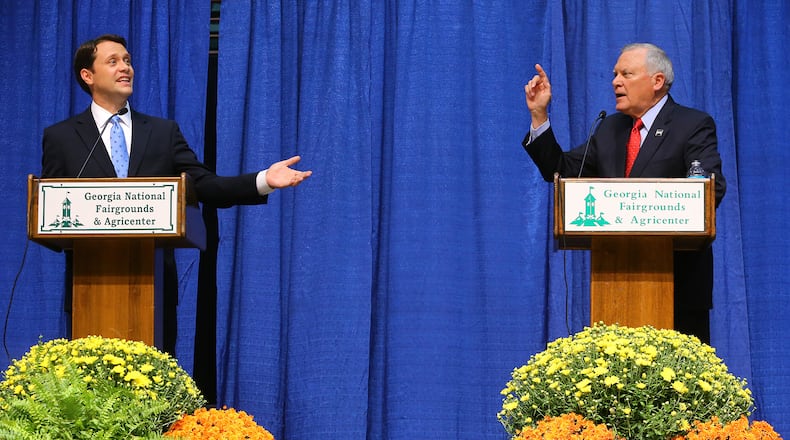In the state Senate, Jason Carter championed an effort to place an income cap on eligibility for the HOPE scholarship to ensure it paid full tuition to the most needy recipients. You won't hear him doing the same in the governor's race.
As the back-and-forth between Carter's campaign and Gov. Nathan Deal's allies reached new heights over a robo-call that claimed the Democrat wanted to scuttle the HOPE scholarship for thousands of middle-class families, the two candidates met at a forum Monday to discuss the future of lottery-funded programs.
Carter, who spoke first at the Georgia Early Education Alliance for Ready Students event, said too much money was spent on the lottery system's administration and prizes and not enough on education. He also said that some $286 million that was set aside - beyond the lottery's reserve needs - should be invested in school programs. "It's doing nothing," he said.
After the event, Carter was asked whether he would still support an income cap that's at the heart of the GOP attack. He previously proposed limiting eligibility to families with an income of $140,000 or less, but critics say that Democrats would be forced to lower that threshold to fulfill their promise of paying full tuition for HOPE scholars.
Said Carter:
"I think we do need to consider, at some point, need. Because you cannot pay for everybody. We want to maximize the number of people. I don't think anyone is talking anymore about a solid cap. It's probably too blunt an instrument. We want to make sure what we're doing is maximizing the number of people, and finding ways to make sure we consider need without a full-fledged cap."
How would he do that? Carter said there were a range of options, including existing scholarships for needy recipients, but he didn't give specifics.
"There's a lot of things to consider, and also the amount that everybody gets could change," he said.
Carter's camp said his remarks Monday didn't indicate a sudden policy shift, and noted that he was quoted in January also saying an income cap was "too blunt."
But the Deal campaign was loathe to let the remark slide. "It's literally taken Jason Carter three and a half years to realize you 'cannot pay for everybody' -- a conclusion that responsible Republicans and Democrats reached when they took courageous votes to save HOPE from bankruptcy," said Brian Robinson, a spokesman for the Deal campaign.
At the forum, Deal pointed to the record-setting $945 million in profits that the Georgia Lottery will pump into HOPE and pre-K programs as a sign of the agency's success. And he said he was open to exploring ways to increase pre-kindergarten funding, though he said it would partly depend on legislators and the public's attitude.
Lottery officials pushed back against Carter's critique of the agency's management, saying that increasing the percentage of education funding wouldn't necessarily mean more money for HOPE and pre-K. They sent over the explanation below, which contends that slashing prize payouts would also reduce sales.:
When Georgia's lottery legislation was drafted 20 years ago with a 35% target, it represented more of the drawing games that payout at a lower percentage than the instant (scratch-off) games that are more popular now. The "as nearly as practical" language included in the legislation allowed the lottery to be flexible and change with the marketplace.
Lottery case study after case study details the potential for unintended negative consequences of slashing prize payouts to boost profit. While profit percentages may increase – real dollars to beneficiaries decrease. In 1997, the Texas Legislature decreased prize payouts on instant games. The action resulted in a 40% decrease in instant sales ($1 billion sales loss) over a two year period. although the percentage return to beneficiaries increased from 31.58% to 35.01%, the real dollars to beneficiaries dropped by more than $155 million (-24.5%). After the prize payout reduction was reversed, it took 7 years for instant sales in Texas to return to 1997 levels.
Percentages cannot fund scholarships and Pre-K classrooms, only real dollars.
Deal, for his part, said in an interview after the event that lottery executives need flexibility to keep more money in the bank or there could be "disastrous" consequences.
"The reserves are important because in down times you need to call on those reserves," said Deal, adding: "It's not wise, it's not smart, to start dipping into those reserves."
About the Author
The Latest
Featured




